| |||||
| Decades: | |||||
|---|---|---|---|---|---|
| See also: | |||||
The following lists events that happened during 2016 in Jordan .
| |||||
| Decades: | |||||
|---|---|---|---|---|---|
| See also: | |||||
The following lists events that happened during 2016 in Jordan .
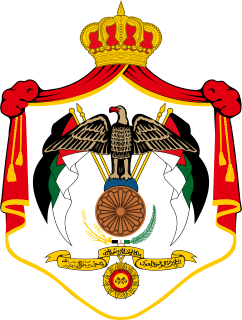
The politics of Jordan takes place in a framework of a parliamentary monarchy, whereby the Prime Minister of Jordan is head of government, and of a multi-party system. Jordan is a constitutional monarchy based on the constitution promulgated on January 8, 1952. The king exercises his power through the government he appoints which is responsible before the Parliament. In contrast to most parliamentary monarchies, the monarchy of Jordan is not ceremonial, with the King having significant influence over the affairs of the country.

The history of Jordan refers to the history of the Hashemite Kingdom of Jordan and the background period of the Emirate of Transjordan under British protectorate as well as the general history of the region of Transjordan.

Abdullah II bin Al-Hussein is King of Jordan, having ascended the throne on 7 February 1999. He is a member of the Hashemite dynasty, who have been the reigning royal family of Jordan since 1921, and is considered a 41st-generation direct descendant of the Islamic prophet Muhammad.

Al-Karak, is a city in Jordan known for its medieval castle, the Kerak Castle. The castle is one of the three largest castles in the region, the other two being in Syria. Al-Karak is the capital city of the Karak Governorate.
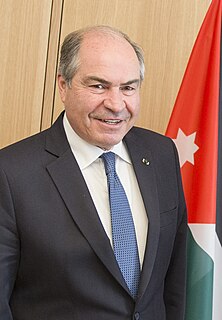
Hani Fawzi Mulki is a Jordanian politician that held several ministerial and diplomatic positions, and he was Chief Commissioner of the Aqaba Special Economic Zone Authority before his designation as the 41st Prime Minister of Jordan by King Abdullah II and approval by the House of Representatives on 29 May 2016.
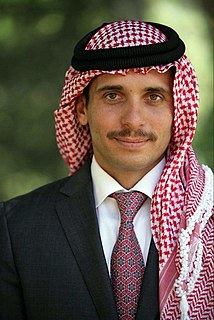
Hamzah bin Hussein, is the fourth son of King Hussein bin Talal of Jordan overall and the first by his American-born fourth wife, Queen Noor. He was named Crown Prince of Jordan in 1999, a position he held until his older half-brother, King Abdullah II, rescinded it in 2004. He is a member of the Hashemite dynasty, the royal family of Jordan since 1921, and is a 41st-generation direct descendant of Muhammad. Hamzah is currently believed to be under house arrest since April 2021, after being accused of attempting to destabilise the Kingdom of Jordan and fomenting unrest. Hamzah renounced his title of prince in April 2022.

Hussein bin Abdullah is Crown Prince of Jordan as the son of King Abdullah II. As a member of the Hashemite dynasty, the royal family of Jordan since 1921, he is a 42nd-generation direct descendant of Muhammad.
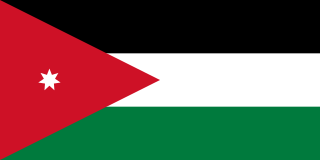
Jordan, officially the Hashemite Kingdom of Jordan, is a country in Western Asia. It is situated at the crossroads of Asia, Africa and Europe, within the Levant region, on the East Bank of the Jordan River. Jordan is bordered by Saudi Arabia to the south and east, Iraq to the northeast, Syria to the north, and the Palestinian West Bank, Israel, and the Dead Sea to the west. It has a 26 km (16 mi) coastline on the Gulf of Aqaba in the Red Sea to the southwest. The Gulf of Aqaba separates Jordan from Egypt. Amman is Jordan's capital and largest city, as well as its economic, political, and cultural centre.
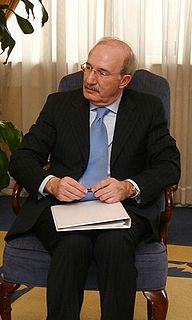
Nader Dahabi is a Jordanian politician who was the 37th Prime Minister of Jordan from 25 November 2007 to 14 December 2009. He took office following the resignation of Marouf al-Bakhit, and days after the parliamentary elections in which Islamists and opposition were defeated by pro-regime candidates. On 9 December 2009, he handed in his resignation to King Abdullah II, along with the rest of his government.

The Parliament of Jordan is the bicameral Jordanian national assembly. Established by the 1952 Constitution, the legislature consists of two houses: the Senate and the House of Representatives.
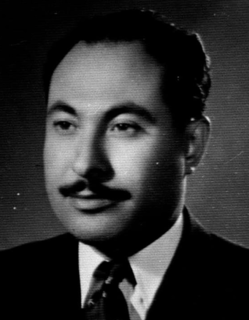
Hazza' Barakat al-Majali was a Jordanian politician that served as the two-time 11th Prime Minister of Jordan. His first term lasted one week in 1955, his second term lasted from mid-1959 until his assassination.

Ayman Hazza' al-Majali is the former Deputy Prime Minister of the Hashemite Kingdom of Jordan. He is the son of Jordan's late Premier Hazza' al-Majali. As a Member of Jordan's House of Representatives he also headed the parliament's Lower House Finance Committee.

The Jordanian protests were a series of protests in Jordan that began in January 2011, and resulted in the firing of the cabinet ministers of the government. In its early phase, protests in Jordan were initially against unemployment, inflation, corruption. along with demanding for real constitutional monarchy and electoral reforms.

The 2016 FIFA U-17 Women's World Cup was the fifth edition of the FIFA U-17 Women's World Cup, the biennial international women's youth football championship contested by the under-17 national teams of the member associations of FIFA. The tournament was held in Jordan from 30 September to 21 October 2016.

Muath Safi Yousef al-Kasasbeh was a Royal Jordanian Air Force pilot who was captured and burned to death by the militant group ISIL after his F-16 fighter aircraft crashed over Syria.

The Jordanian military intervention in the Syrian Civil War began on 22 September 2014, with airstrikes on Islamic State of Iraq and the Levant (ISIL) targets, and escalated after the murder on Muath al-Kasasbeh, a captured Jordanian pilot, by ISIL, in early 2015. Though Jordan's strikes in Syria largely tapered off after December 2015, airstrikes have continued through February 2017, and Jordan has continued to support rebel groups in Syria and host military activities of other countries.

General elections were held in Jordan on 20 September 2016 to elect the 18th House of Representatives. The elections were announced after parliament was dissolved by King Abdullah II on 29 May 2016, with the King appointing Hani Mulki as interim Prime Minister following the resignation of Abdullah Ensour.

On 18 December 2016, a series of shootings took place in the city of Al-Karak in southern Jordan. The attack started in the vicinity of Al-Karak where a group of unidentified militants ambushed emergency responders and then moved into the city, attacking police patrols and the local police station and finally seeking shelter in the historic Crusader-era Kerak Castle, a popular tourist attraction.
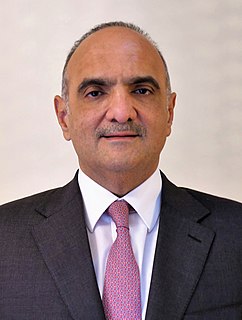
Bisher Al Khasawneh is a Jordanian politician and diplomat who is serving as the 43rd Prime Minister of Jordan and Minister of Defense since 12 October 2020.